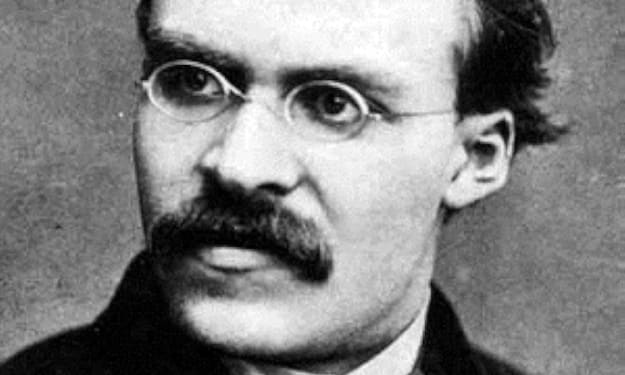Becoming Who You Really Are
The Philosophy of Friedrich Nietzsche

Friedrich Nietzsche: Pioneering a New Path in Western History
Friedrich Nietzsche stands at the forefront of one of the most significant shifts in Western history. He not only predicted the causes and consequences of this shift but also provided revolutionary ideas for possible solutions. Nietzsche is undoubtedly one of the most influential and significant thinkers in modern history.
Nietzsche found himself at a unique crossroads, a point in history where Western religious faith was crumbling, leaving a massive void in people's lives, filled with suffering and seemingly only one alternative: pessimism and nihilism. His life's work was dedicated to addressing this emerging issue by forging a new path that moved away from both religious faith and nihilism, towards new meaning and human values.
Born in 1844 in Saxony, Prussia, which is now part of eastern Germany, Nietzsche had a modest upbringing in a religious family. His father, Carl Ludwig Nietzsche, served as the town's Lutheran pastor, introducing young Nietzsche to Christianity. However, this foundation was soon challenged when his father was diagnosed with a terminal brain disease and passed away at the young age of 35. The loss of his father, coupled with the death of his younger brother Ludwig, exposed Nietzsche to the irreconcilable reality of undeserved suffering, which would later influence his philosophical work.
Nietzsche's academic journey led him to study theology at the University of Bonn, where he initially excelled in Christian theology. However, within just one semester, he became increasingly critical and exposed to critiques of Christianity, ultimately leading him to abandon his Christian faith. He then turned his focus to philology, the study of the history of language, and excelled in it. In his mid-twenties, he became the youngest professor ever hired when he was appointed as a professor of classical philology at the University of Basel.
After a few years of teaching, Nietzsche left his position, partly due to dissatisfaction with academia and partly due to declining health resulting from a combination of genetic ailments and a potential case of syphilis contracted at a brothel. He led an isolated life, traveling across Europe and residing primarily in the Swiss Alps, where he dedicated his time to philosophical pursuits.
During this period of solitude and introspection, Nietzsche produced his most influential works, including "Human, All Too Human," "The Gay Science," "Thus Spoke Zarathustra," "Beyond Good and Evil," and "On the Genealogy of Morals." These works laid the foundation for a new philosophy that challenged contemporary certainties, notions of good and evil, and the existence of universal truths.
One of Nietzsche's key ideas was the rejection of the pursuit of universal objectivity and meaning beyond this life. He famously proclaimed, "God is dead," expressing his concern about the collapse of European morality and values following the decline of religious faith. He argued that there are no facts, only interpretations, denying the existence of a universal, objective truth.
Nietzsche turned his attention to the arts and humanities as essential means to communicate deeper truths and fill the void left by the collapse of traditional values. However, he recognized that these cultural expressions could become stale, academic, or commodified, losing their potency.
In response to these challenges, Nietzsche developed a philosophy that emphasized individual pursuit of creative expression and subjective greatness. This philosophy was embodied in the concept of the Übermensch, often translated as the Overman or Superman, introduced in his book "Thus Spoke Zarathustra." The Übermensch represents an idealized version of oneself, a symbol of personal growth and independence from collective experiences.
Nietzsche believed that the pursuit of personal growth, aligned with this idealized self, was fundamental to finding meaning and value in life. He called this process "self-overcoming," a cycle of self-dissatisfaction, self-improvement, and self-rediscovery. By setting goals that align with this idealized self, one could transform the suffering inherent in life into something personally redeemable and affirming.
Nietzsche's philosophy asserted that suffering should not be avoided but embraced as a source of strength and personal growth. He argued that life is characterized by suffering and that its meaninglessness, not suffering itself, is the real challenge. He famously wrote, "If we have our own 'why' in life, we shall get along with almost any 'how.'"
As Nietzsche continued to write and live an increasingly isolated life, he faced declining mental health. At the age of 44, he experienced a mental breakdown while witnessing a horse being mistreated. This event marked his descent into madness, eventually leading to a state of catatonia.
Nietzsche died in 1900 at the age of 55, leaving a legacy of influential philosophical ideas. Despite his initial lack of recognition and success during his lifetime, his work gained significant attention and respect following his death. Nietzsche's quotes, aphorisms, and ideas continue to resonate in modern culture, offering diverse interpretations and challenging individuals to think for themselves and pave their own philosophical paths.
In conclusion, Nietzsche's ideas are open to interpretation and critique, and his philosophy encourages individuals to chart their own intellectual journeys, just as he did throughout his life.
About the Creator
Daniel Stevens
I'm a young multifaceted writer. I write about everything from Science to Philosophy, my take on the life stories of great people from the past and the now.
If you are like me, interested in many different topics you defiantly love my work.






Comments
There are no comments for this story
Be the first to respond and start the conversation.